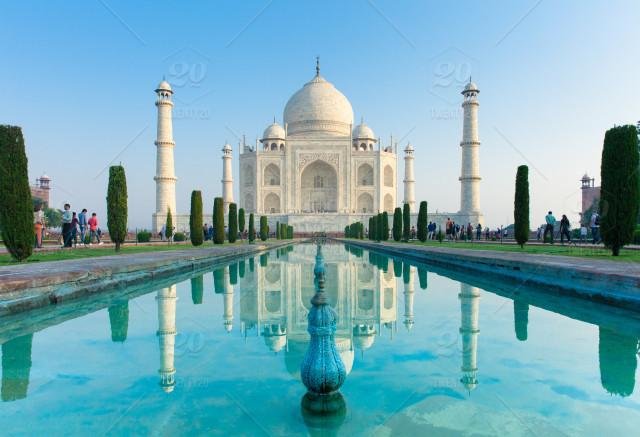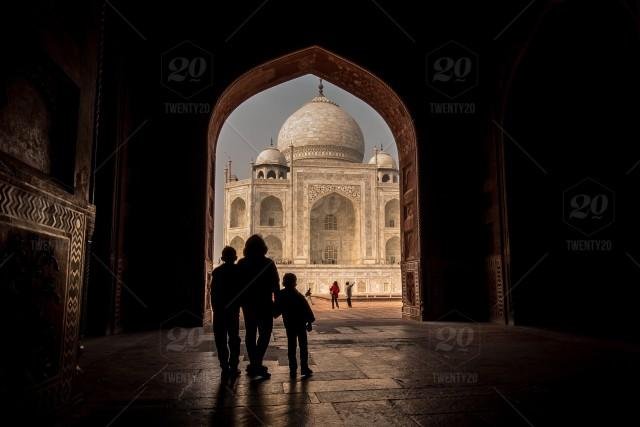source
Many of our information about the Taj Mahal is unknown. Tomb of Tajmahal emperor Shahabuddin Muhammad Shahjahan's mausoleum. After which the name is Taj Mahal. Khurram, the third son of Emperor Jahangir, was born in 1592. The grandfather grew up as the jewel of Akbar and Nayan Jahangir's eyes. Even his mother is not close to Jagtat Gossei (Bilkis Makani), son of grandson Vidhu grandfather Rokeya Sultana Begum Although well-versed in warfare, he had many other interests, such as architecture, jewelery and crafts.
At the age of 15, he was married to Arjumand Banu Begum, the grandson of the highest office of the Darbar of Umrah, Utidullah. The astrologers did not get a good day in counting, after waiting five years for marriage, they were married in Dhanmondi 1612. After marriage, Arjumand Banu's new name is Mamtaj Mahal. Khurram also got the title of 'Shahjahan' after the success of the battle of Babar and Dakshina after a few years. The ties between the two were deep, Shahjahan used to go anywhere, Momtaz used to stay with him. Even during the war, while staying in Mabar, Gujarat or Burhanpur, Momtaz was with her. During this time in Burhanpur, in 1631 (ie, only three years after the Shahjahan emperor in 1628), Mumtaz died in a sudden death of his 14th child. The emperor was so broken that he could not mind in the rajakas for long. Jahanara, daughter of sixteen eldest daughter, kept her father. Momtaz was buried temporarily in the allocation of Zainabad Ahuqan from a few kilometers from the Shahi Fort in Burhanpur. After returning to Agra, Shahjahan decided to build a tomb for his Begum. From contemporary details, it is known that, the selection of the place, the appointment of architects and engineers, the concept of the monastery, ornamentation, is done in every respect according to the command of the emperor.
The Jamuna river, which has a large turn from the bottom of the fort to the west, has a magnificent mansion of the king of Man (Singh) of King Man Singh Singh Kachhwahah, who is a Maharattoo of the emperor. According to the name of the castle, the area is called Kaptpura. Umrah Raja (later Mirza Raja), who was then entitled to donate the land, knowing the attitude of the emperor of Jaysingh. However, the construction of a sacred tomb in the land acquired or stolen in accordance with Islam is not mandated, Haveli of Raja Bhagvan Das and Maa Singh's younger brother of Man Singh, Rupghsi Varagi of Atgha Khan market and Haveli-son of Suraj Singh's son-were handed over to the four Haveli jaisinghas. The documents that have been found from this document are a copy of the original document, transferred from the 'Cavalry' archive of Jaipur and now is protected in the bureaucracy's state exchequer. There is no mention of whether there was any temple in this land. Apart from this, none other than Swami Ram Singh (nineteenth century) was the worshiper of Shiva, only the second person of the Kachhwaha clan, everyone was the worshiper of the mother goddess. From a colorful design of the City Palace Museum of Jaipur, it is known that in 1735, there were 42 houses, gardens or mausoleums for the members of the royal family and the Amir-Umrah in the court. Two other documents from the arch of 'Archway' are also revealed that Jaysingh has performed the full responsibility of excavating Marble from Makharna mine in Rajasthan and sending it to Agra.
source
The name of the Taj Mahal is not written officially anywhere. During the reign of Prince, according to Shahjahan's instructions, and after his plan many small monuments were built. For example, Munshian's identity is found in his architectural construction in the construction of some of the portions of the Lahore fort, two pleasant bargains at Ajmer's Anasagar, Shahibbad Palace in Ahmedabad, Diwani-Mango, Dewani Khas and Hamam, Shahi Kella of Shahahirpur in Burhanpur. So there is no doubt that the concept of Taj's creation and the direct impression of his thinking will be created.
The magnificent mausoleum of the Mughal emperors was made before, such as the tombs of Humayun in Delhi and Akbar's Tomb in Agra. But Shahjahan wanted to shape his thoughts in a different way. The three mausoleum was built in the middle of the garden but Taj was built in the north of the garden, on the bank of the river.
Although it is not officially mentioned that the car was prepared for the design of Taj, we are fairly sure that the Chief Architect of Taj is Ustad Ahmad Lahori. From the words 'Dewan-e-Muhindis' written by Lutfullah Muhindis, it is known that his father Ustad Ahmad earned fame as architect, technician, mathematician and astronomer, and he was not only the Taj Mahal, but also the architect of Shahjahanabad and Lalkalla in Delhi. The emperor was pleased with his work and awarded him the title of 'Nadir-ul-Asr' (the world's best). Laharti helped Ustad Hamid Designer Md. Abdul Karim took up the responsibility of constructing the design according to Jahangir. Jahangir gave him the title of Mamur Khan (architect khan). To help him, Makhmat Khan. The main structure is a bamboo brick made of special spices, a white-colored boulder over it. The main attraction of the monument is about 35 meters high dome. According to some sources, the responsibility for the construction of dome was entrusted to Turkish architect Ustad Isha and Ustad Afandi. There is no doubt about its authenticity as there is no written support available. Heavy peacock copper plates, about nine'm in length from the middle of the lotus flowing over the dome, This is whether or not the name of gold jeweler Kazim Khan of Lahore.
source
The beauty of Taj's main reason is that the decoration above the high door arch on the walls and four sides. The row of trees on the bottom of the wall, with very careful relief work. It is so breathtaking that it wants to touch. Although flowers seem to be recognized, it is not well known. The name of the creator of Arabic script, Nashek Shaili, which is inscribed on the brink of the arch, is known only because he has written his own name on the outer wall and inside one place. In fact, there is no name or date other than the name and date of the only scribe, the only scribe, in this huge house. At the beginning of the reign of Jahangir, two great scholars from Siraj came to the Mughal court. The elder brother Molla Shukrala Sirajji was given the title of Afzal Khan and was elevated to the post of chief minister, in the special confidence of Shahjahan. He was known as the younger brother Abdul Haq Siraji Lipidi, who used to be the first in the southern door of the tomb of Akbar in Seccendar. After getting the title of Amanat Khan, he was promoted to the post of Shahjahan's chief scribe.
Inside the southern entrance of the mausoleum, under the magnificent dome of the Taj, in the darkness and darkness, the mirror dome encroaching on two tomb at the first, It is said that it took ten years to complete the work of 'Pacchinter' or 'Pietra-Dura' for flowering plants, making jalas on these eight stones and various colorful gem-stone pieces. The work of this strange 'Inale' from Tibet to Tarquez, Safiar from Kashmir, Agate from Gujarat, Karnalian from Arab country, Zadar from Kashgarh, Badakasam from Lapis Lajuli, Sri Lanka and Myanmar was completed. This works of small and big flowers on the rectangular rectangle just below the dome, and around two meters high netting surrounding them, this work has provided a completely different dimension. According to some sources, the work was done by Delhi's renowned miner Chirigilal. And many others, the artisans from Florence in far-flung Italy, taught the artisans of the country to work in 'Inline' with various colored stones. Most European travelers, mainly seeing this work, thought that the Taj was designed by a European.
source
A French gold artist, Augustus de Bordo, worked for many years in Jahangir's court. Seeing his new kind of throne, Jahangir gave him the title of 'Homeranda'. But he died before the construction of Taj was started in 1632.
After the construction of Taj was completed, the Emperor made proper arrangements for his maintenance. In the vast area on the southern side, with the Taj design, the karavansararai and katra (market) for retail and wholesale businesses, which are arranged for regular cleanliness and work-for-profit from the rents and rentals of many villages. But after the Shahjahan disfigurement and house arrest after a few years, the Taj is gradually being neglected. Once it was known that Aurangzeb was arranged to stop water from the roof, it was not clear that he had given special attention to his mother's tomb. However, in Begumpur, Aurangabad, it is found that Taj was followed in the design of his chief Begum Dilars Banu's tomb, Bibi-ka-Makwara. In the eighteenth century, more misery came to an end. At first, the Syed brothers of Delhi, who took possession of the masnad in 1719, plundered the 'pearls' of precious stones placed on the tomb of Mamtaz on Friday every Friday. After that, in 1761, the Jatha Looteraar took the wooden door of Taj's thick cotton wrapped away. After that the turn of the English. After the Mutiny of 1857, before the entrance of Taj, army camps were arranged in 'Jiloukhana', in the garden, and arrangements were made for the army officers in the eastern 'Mehmananahan'. The garden is destroyed, the precious stones of the fountains made of metal, the jalis and the tombs are truncated, the gold plate is removed from the copper plate. Its weight or several kilos as of now Later, with the special effort of the Viceroy Lord Curzon, Taj returned much of his old glory. However, the most lasting damage to the Taj has been in recent times, when a huge refinery of petrol is built in Mathura. It is not possible to meet the damage caused by the white powder of Taj, due to the chemical glaucoma. I do not know how long the water will remain and the duration of the sunlight flowing in Kalol Kapolite.
From the fancy of a powerful emperor, the emperor gradually transformed the poetry of Taj Mahal into a symbol of tears in Birah. Shahjahan has many qualities, but he does not know whether he has written poetry, but it is undeniable that he has been able to make his 19 year old woman in perpetual shape. It can be said, I saw the Taj. There is nothing to see.




delegate your sp to flymehigh if you don't know, how to earn passive income by delegating your SP click here for more info Join our discord You can promote your posts. Thanks.Nice post ! You got 10.33% upvote from @flymehigh. Earn free sbd/steem daily by delegating(renting) your SP. We share high return, click here to